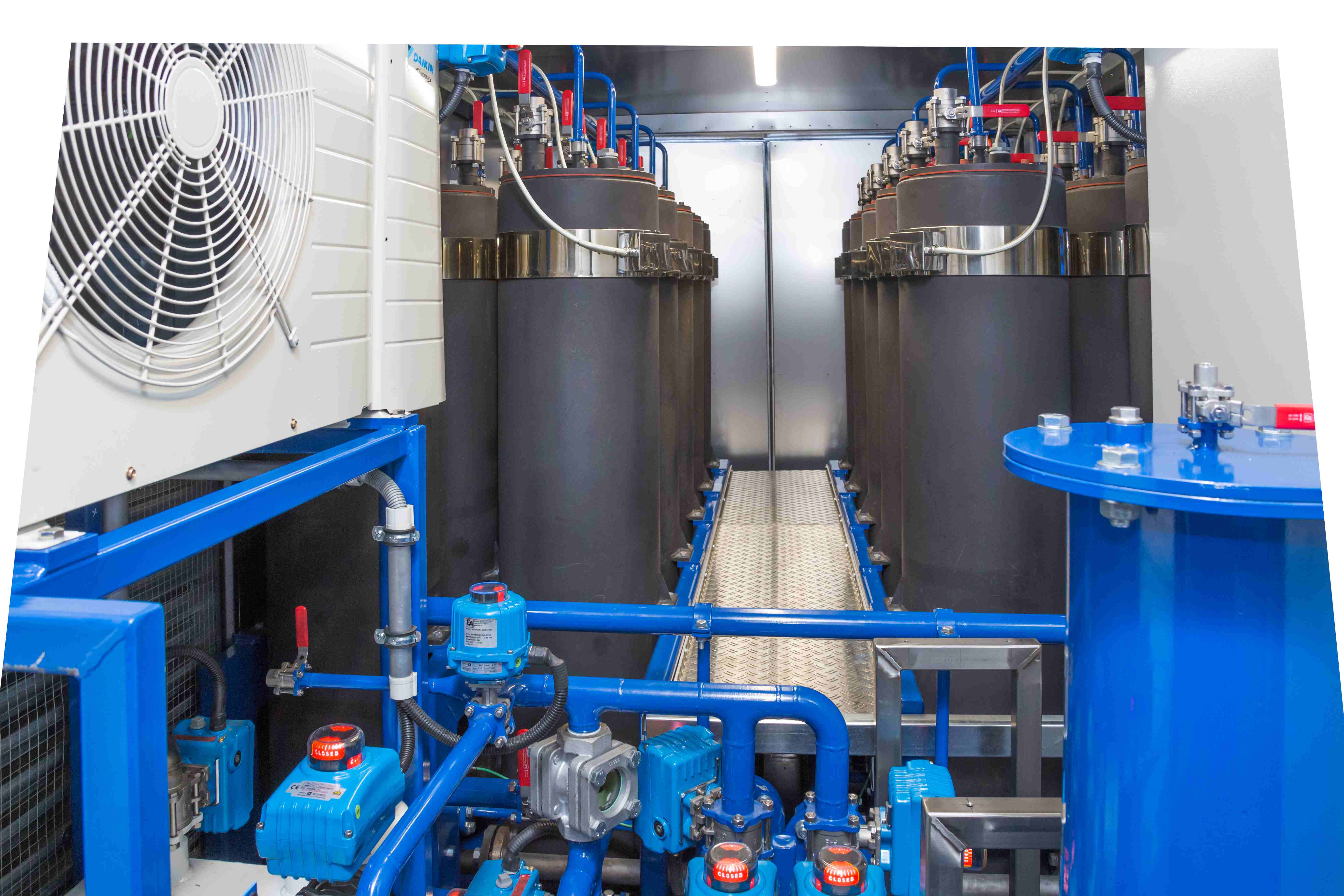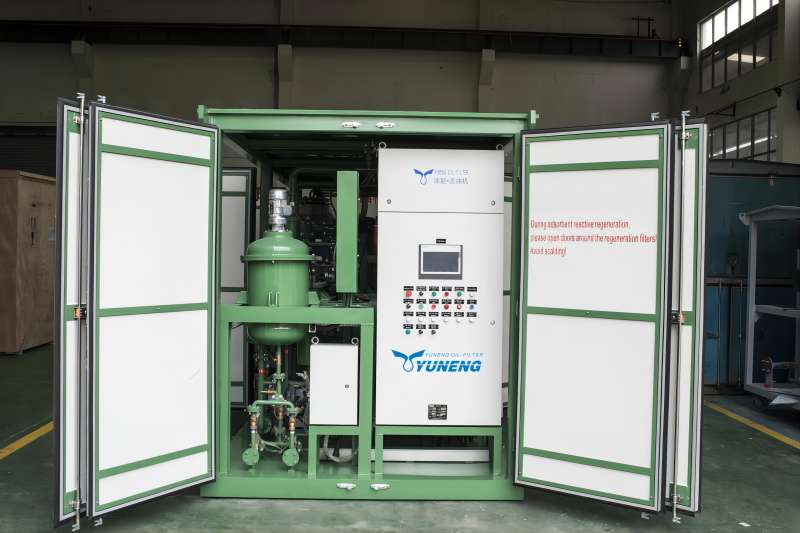Affordable and Eco-Friendly Transformer Upkeep With Regenerated Oil
The assimilation of regenerated oil in transformer upkeep provides a compelling approach for organizations seeking to boost both cost-efficiency and eco-friendliness. By making use of oil that preserves efficiency requirements akin to virgin choices, companies can significantly lower operational prices while concurrently minimizing their ecological impact. This strategy not only resolves the monetary burdens related to garbage disposal and frequent oil modifications but likewise adds to wider sustainability campaigns. The implications of this shift expand beyond instant benefits; recognizing the complete scope of its advantages needs a closer evaluation of the principles and practices included.

Recognizing Regenerated Oil
Regenerated oil, typically described as re-refined oil, is an essential part in the upkeep of transformers, providing both economic and environmental benefits. This oil is originated from used mineral oils that have undergone a comprehensive purification process, effectively removing contaminants and restoring the oil to a quality comparable to virgin oil. The regeneration procedure typically involves several phases, consisting of physical splitting up, chemical therapy, and purification, ensuring that impurities such as sludge, water, and hefty steels are gotten rid of.
The usage of regrowed oil in transformers is important for optimizing performance and expanding tools life expectancy. High-grade re-refined oil keeps its dielectric buildings, making certain effective insulation and protecting against electric malfunctions. In addition, it possesses exceptional thermal conductivity, which aids in managing the operational temperatures of transformers, ultimately enhancing their reliability and performance.
In addition, taking on regrowed oil not only sustains cost-efficient maintenance strategies but additionally minimizes the need for new oil manufacturing, thus conserving all-natural resources. Transitioning to re-refined oil is a smart option for organizations intending to preserve high operational criteria while simultaneously taking care of budget plan constraints. Recognizing the properties and benefits of regenerated oil is vital for notified decision-making in transformer upkeep methods.
Ecological Benefits
Making use of restored oil in transformer maintenance supplies significant ecological benefits that add to lasting methods within the power sector. Among the primary advantages is the decrease of waste oil disposal, as regenerated oil is obtained from the recycling of made use of transformer oil, considerably lowering the quantity of contaminated materials produced. This procedure helps alleviate the ecological dangers connected with inappropriate disposal methods, which can cause dirt and water contamination.
Additionally, the regeneration procedure preserves natural sources by lessening the need for new base oil production - Transformer Oil Regeneration. This conservation effort not just lowers the removal effect on communities yet additionally decreases the carbon impact linked with oil production. By embracing restored oil, business can enhance their dedication to ecological stewardship and align with international sustainability goals
Additionally, the usage of restored oil boosts the general effectiveness of transformers, causing decreased energy losses and lower greenhouse gas exhausts. As the power industry significantly encounters stress to reduce its ecological effect, embracing regenerated oil stands for an aggressive technique to accomplishing both ecological and operational objectives. In recap, the ecological benefits of using regenerated oil are complex, promoting a much healthier world while supporting the power market's shift in the direction of sustainability.
Price Cost Savings and Performance
Utilizing regenerated oil in transformer upkeep can cause significant price savings and boosted functional efficiency for power companies. Restored oil, created via sophisticated purification procedures, provides equivalent efficiency to new oil at a portion of the cost. By recycling oil that would or else be discarded, firms can decrease their getting expenses while decreasing waste disposal prices.
Furthermore, the long term life cycle of regrowed oil translates to reduced frequency of oil adjustments, resulting in lower labor prices and reduced downtime for upkeep tasks. Reclaimed Transformer Oil. This not only improves functional effectiveness yet also enables an extra structured maintenance routine, making it possible for firms to allocate resources better
Furthermore, the usage of restored oil can lead to lower insurance policy costs due to its eco-friendly account. As power firms encounter increasing scrutiny regarding their environmental impact, embracing sustainable methods such as making use of restored oil can reinforce their track record and possibly draw in financial investment.
Inevitably, the assimilation of restored oil right into transformer upkeep techniques offers a strategic opportunity for power firms to attain significant cost financial savings while advertising functional effectiveness, therefore straightening economic efficiency with environmental obligation.
Comparison With Conventional Oils
While traditional oils have long been the standard in transformer maintenance, a comprehensive comparison reveals that regenerated oils provide a number of benefits that boost efficiency and sustainability. Standard mineral oils, while efficient, commonly pose ecological risks, such as contamination and disposal concerns. On the other hand, regenerated oils are stemmed from recycled weblink materials, significantly lowering their eco-friendly footprint.
They generally show remarkable oxidative security, which equates to longer solution life and decreased regularity of oil changes. This particular not just improves transformer efficiency but likewise minimizes downtime and maintenance prices.
This high quality is vital in keeping transformer functionality under varying operational conditions. In general, the benefits of regenerated oils over traditional oils highlight their possible to revolutionize transformer maintenance practices, offering a more responsible and efficient choice.
Execution in Upkeep Practices

As soon as the analysis is full, a customized strategy for transitioning to regrowed oil ought to be developed, considering variables such as compatibility with existing products and functional problems. Educating for maintenance workers is essential, as they must recognize the special residential properties of regenerated oils and exactly how to manage her response their application properly.
Applying an extensive monitoring program will facilitate the evaluation of efficiency metrics post-implementation, making sure the regenerated oil satisfies the called for operational criteria. Transformer Oil Regeneration Plant. Additionally, developing a normal maintenance timetable will assist in recognizing potential problems early and permit for timely rehabilitative activities
Final Thought
To browse around this web-site conclude, the adoption of regrowed oil for transformer upkeep presents a feasible service that lines up financial advantages with ecological sustainability. By decreasing costs related to oil modifications and waste disposal, while at the same time extending the life expectancy of devices, companies can improve functional performance. The change to regenerated oil not only reduces environmental effects however additionally sustains more comprehensive sustainability purposes, making it a prudent choice for modern maintenance practices in the energy industry.
Regenerated oil, commonly referred to as re-refined oil, is an essential component in the upkeep of transformers, providing both environmental and economic advantages. This oil is acquired from made use of mineral oils that have actually undergone a thorough filtration procedure, successfully eliminating pollutants and bring back the oil to a high quality similar to virgin oil.Furthermore, embracing regenerated oil not only sustains cost-efficient upkeep approaches yet likewise minimizes the requirement for new oil production, thereby preserving all-natural sources. One of the main advantages is the decrease of waste oil disposal, as regenerated oil is obtained from the recycling of utilized transformer oil, considerably decreasing the quantity of unsafe waste produced. Regrowed oil, produced via innovative purification procedures, uses similar performance to new oil at a portion of the expense.